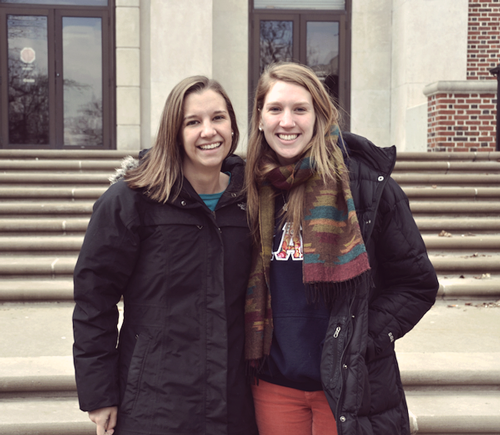Five student papers were accepted at the Undergraduate Honors Conference for Communication and Theatre, held at Depauw University.
This important national conference, featuring “top undergraduate students and exemplary scholars in communication studies for an intensive weekend of scholarly dialogue,” accepts no more than 100 papers each year, yet Denison students took five of this year's slots. The conference supports undergraduate research and also serves as an opportunity for students to network and share their ideas with many top scholars.
The chair of the department, Amanda Gunn, said “We couldn’t be more excited for these students; they’ve all worked really hard.”
The accepted papers were:
- Stacey Adams ‘15, Monica Edgerton ‘14, and Jillian Foster ‘16: “How are Public Speakers Talking about Local Foods? : A Critical Discourse Analysis,” written for Dr. Amanda Gunn’s Environmental Communication course.
- Claire Hamilton ‘14: “Presidential Families as Persuasive Discourses; The Obama Family Narrative,” written for Dr. Suzanne Condray’s Communication and the Presidency course.
- Dallas Manson ‘14, Libbie Randolph ‘14, and Justin Weiss ‘14: “The Efficient Use and Conservation of Fresh Water in the United States and India,” written for Dr. Gunn’s Environmental Communication course.
- Lanning McDonald ‘14, Sarah Nye ‘14, Whitney Powel ‘15, and Grace Putman ‘16: “To Label or Not To Label: A Critical Discourse Analysis of Current Political and Organizational Speech Framing the GMO Labeling Debate in the United States,” written for Dr. Gunn’s Environmental Communication course.
- Paige Robnett ‘14: “Changing the Game: Hillary Clinton Redefining and Reinforcing Gender Expectations in the 2008 Election,” written for Dr. Condray’s Communication and the Presidency course.
Claire Hamilton researched how public figures spin their families to gain political support, focusing particular on speeches by Barack and Michelle Obama, as well as interviews and videos highlighting their family. Said Claire of the conference, “I think it will be fun and it’s a good opportunity senior year to see what research looks like beyond the college level.”
While Dallas Manson explained the conference process as a lot of work writing and rewriting their presentation, she added, “We were so excited and proud of ourselves that it was accepted.” Her group’s research found that private ownership of water resources in the U.S. lead to less water conservation than in India, which has socialized ownership of their water resources.
Whitney Powel’s team examined the national political conversation for and against labeling of genetically modified organisms (GMOs), finding it to be primarily driven by profit rather than health and environmental considerations. “I think something that we were all excited about while writing this paper together was our ability to present and articulate our own ideas and conclusions,” Whitney said. “We’ve come from a lot of different academic backgrounds and have done research, but in this paper, we were able to form our own understanding and conclusions after analyzing the communication and discourse we read everyday”
Jillian Foster and her group looked at how political figures and organizations discuss local foods, specifically how they communicate their views and become involved with local food growers and activists. They found that, although politicians may portray an image of being deeply committed to the issue, this might really just be “fluff.” Speaking of her group’s acceptance to the conference, Whitney called herself “obviously very astounded and ecstatic,” adding that it was “really cool for us to be working in a group not only for the paper but for one common goal and learning to work with other people.”
Paige Robnett built her project around feminist standpoint theory, which, as she explains, “is something I have a lot of experience with since I’m a women’s studies major, so it was cool to be able to incorporate both majors into a project.” She critiqued the media coverage of Hillary Clinton’s emotions, particularly a crying incident during the 2008 campaign, and analyzed how Hillary redefines the stereotypes of women in politics.
The chair of the department, Amanda Gunn, said “We couldn’t be more excited for these students; they’ve all worked really hard.”






